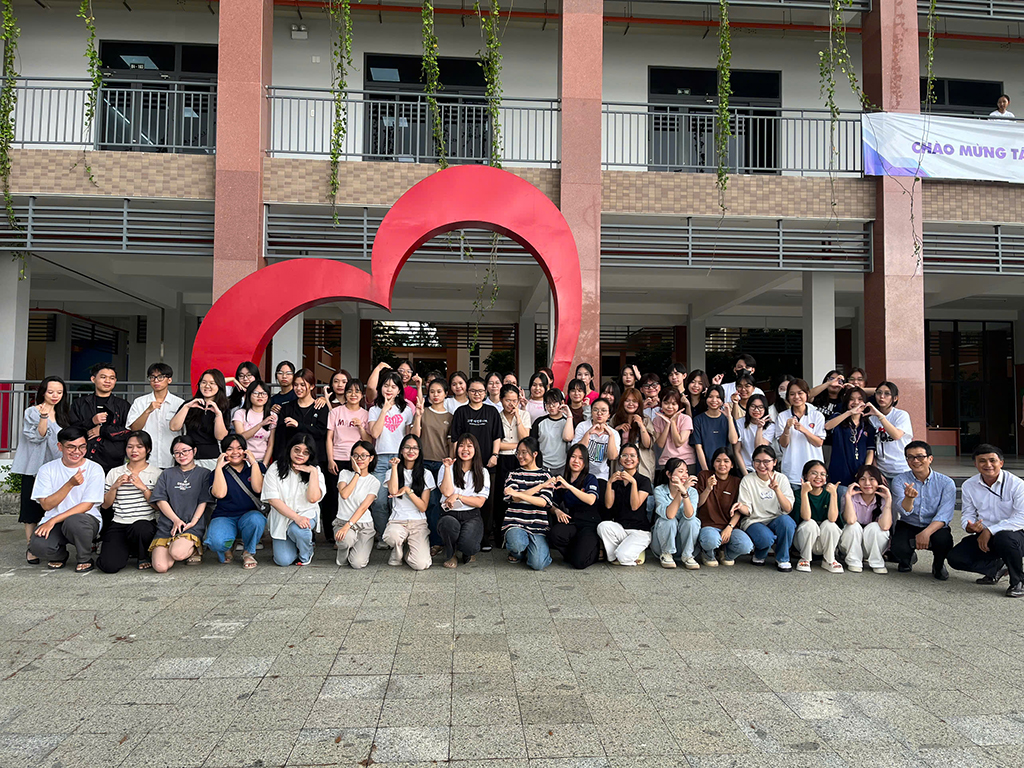A new trend in university education recently implemented involves two universities collaborating to offer the same program. Students enrolled in this inter-university program have unique experiences in admissions, training, and degree awarding.
FIRST TIME EVER: INTER-SCHOOL TRAINING PROGRAM
This inter-university training model was first implemented at the Vietnam National University Ho Chi Minh City (VNU-HCM). VNU-HCM's development strategy for the period 2021-2030, with a vision to 2045, sets the goal of having 20 new interdisciplinary, inter-university training programs to meet societal needs. These programs will award degrees jointly by two member units, with priority given to social sciences, economics -law, and technology.

Students majoring in Korean Business and Trade - Vietnam National University Ho Chi Minh City
To implement this strategy, the Vietnam National University Ho Chi Minh City (VNU-HCM) will expand the number of interdisciplinary and inter-university programs in the coming time. According to a representative of the VNU-HCM Training Board, two interdisciplinary programs have been approved in 2024: Korean Business and Education Technology. In 2025, it is expected that two more undergraduate programs under this program will be opened, focusing on the collaboration between agriculture and information technology, and economics and information technology; and one postgraduate program combining health sciences and engineering technology…
OPPORTUNITY TO RECEIVE 2 GRADUATION CERTIFICATES
The interdisciplinary program is established by combining two training programs from two member institutions to create a new program. After approximately five years of study, students have the opportunity to receive two degrees. Beyond just a combination of training programs, the program also involves collaboration between the two universities throughout the training process, and the final semester will include an interdisciplinary thesis or project.
Sharing more about the trend of opening interdisciplinary programs, a representative from the Training Department of the Vietnam National University Ho Chi Minh City (VNU-HCM) stated that this direction aims to leverage the strengths of universities within the same system. Along with the application of a pilot training model, these interdisciplinary programs are being opened in the context of the 4.0 industrial revolution, meeting the interdisciplinary needs of the labor market. "Most importantly, there are benefits for students participating in these programs opened under this new trend," the representative emphasized.
In 2024, Korean business administration became the first interdisciplinary program assigned by the Vietnam National University Ho Chi Minh City to the University of Social Sciences and Humanities in collaboration with the University of Economics and Law.
Dr. Pham Tan Ha, Vice Rector of the University of Social Sciences and Humanities (Vietnam National University Ho Chi Minh City), said that in its first year of implementation, the Korean Business Administration program has attracted quite a lot of students. The admission scores based on high school graduation exam results for all subjects in the D group averaged 8-9 points per subject.
In practice, Dr. Ha stated that from their first year, students in this program participate in learning at two universities, covering subjects from general to foundational and specialized levels. The two universities agree on a training program, with the University of Social Sciences and Humanities providing approximately 80 credits and the University of Economics and Law approximately 60 credits. Upon completion, the bachelor's degree is awarded by the University of Social Sciences and Humanities. However, if desired, students can take an additional 30-40 credits over 1-2 semesters to receive a second degree from the University of Economics and Law.
"Thus, within about 5 years, students have the opportunity to receive two university degrees from this interdisciplinary program. Unlike dual-degree programs, students in this interdisciplinary program will not struggle with arranging their personal study schedules when studying two majors at two different universities simultaneously. Meanwhile, with the first degree integrating knowledge from two fields, graduates can quickly adapt to the labor market," the Vice Rector of the University of Social Sciences and Humanities in Ho Chi Minh City further explained.
According to Dr. Ha, more inter-university training programs need to be implemented in the future. This is necessary to create better job opportunities in the current context where job requirements demand both in-depth and broad knowledge.

The Vietnam National University Ho Chi Minh City will expand the number of interdisciplinary majors in 2025.
N. INTER-SCHOOL ACADEMIC PROGRAMS MEET PRACTICAL REQUIREMENTS
Associate Professor Dr. Nguyen Tuyet Phuong, Head of the Interdisciplinary Science Faculty at the University of Science (Vietnam National University Ho Chi Minh City), also stated that in 2025, the university will begin enrolling students in the educational technology program with a target of 80 students per cohort. In this training program, the University of Science will provide training in information technology, mathematics, and natural sciences. The University of Social Sciences and Humanities will provide in-depth training in education. Furthermore, the two universities will collaborate on courses requiring the integration of both educational and information technology knowledge.
According to Associate Professor Tuyet Phuong, the Bachelor of Educational Technology degree will be awarded by the University of Science. Students may be awarded a second degree if they meet the eligibility requirements for the dual-degree program and accumulate the required number of credits as stipulated in the program. For some other fields of study, students can complete their second degree at either university, such as education studies and software engineering.
Associate Professor Dr. Phuong stated that the field of educational technology is being developed in the context of strong digital transformation, and the demand for human resources capable of integrating education and technology is increasing. The global market is expected to explode in size and value, with educational technology playing a key role. Trends such as online learning, MOOCs (Massive Open Online Courses), artificial intelligence in education, virtual reality, augmented reality, and educational data analytics will create a great demand for experts with in-depth knowledge of both education and technology.
Notably, according to forecasts from HolonIQ's Global Market Intelligence platform, the global education market is expected to reach a value of US$7.3 trillion by 2025, with the education technology sector accounting for approximately US$404 billion, nearly double the US$227 billion in 2020. The Vietnamese market has also witnessed significant investment in education technology (EdTech), demonstrating long-term potential and a high demand for well-trained personnel in this field.
"Therefore, the field of educational technology helps meet that need, training high-quality human resources capable of quickly adapting to market changes and contributing to improving the current quality of education in Vietnam in the context of the strong digital transformation in education taking place not only in Vietnam but also on a global scale," added the Head of the Interdisciplinary Science Faculty at the University of Science.
Source: https://thanhnien.vn/hoc-1-nganh-o-2-truong-185241216215636389.htm








![[Photo] Prime Minister Pham Minh Chinh visits and extends New Year greetings to former Party and State leaders and offers incense to the esteemed predecessors.](https://vphoto.vietnam.vn/thumb/1200x675/vietnam/resource/IMAGE/2026/02/14/1771078465521_dsc-2411-jpg.webp)

































































































Comment (0)